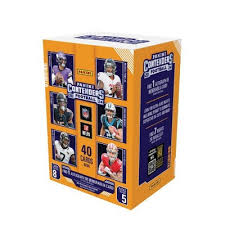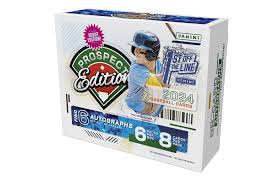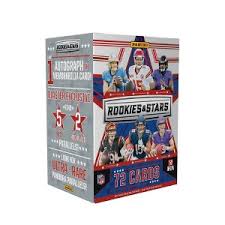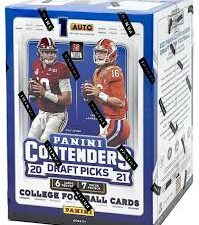

There was a time when you heard the word Panini, you thought toast sandwich. Then you thought of cards. Now, you think about lawsuits.
Yes, Panini was sued yet again. This time, it’s a class action lawsuit. But this time, a civil rights motion claims racial bias against the big card company from Irving, Texas.
In another case, they are involved in a trademark dispute with LaMelo Ball’s company, MB1 Enterprises.
By far, the most high-profile lawsuits Panini is involved in are the ones between them and Fanatics. Panini sued Fanatics for allegedly breaking federal antitrust laws.
Fanatics then promptly countersued Panini for allegedly unfairly using the legal system to intrude on their business. Panini had sued Fanatics for allegedly poaching executives and using confidential information to their advantage.
But there are so many other legal disputes Panini is currently involved in. In 2019, Kevin Brashear sued Panini for failing to produce redemption cards promptly. The Texas-based card company is also involved in a lawsuit with the WWE and the NFLPA, who are trying to get out of their long-term contract with the company to produce wrestling cards.
They are also involved in other lower-profile lawsuits, like the one Panini filed against Ryan Carter.
This month, the embattled company has had to add two more cases to that imposing list. One involves a trademark dispute. Meanwhile, the other claims that Panini has fostered an uninclusive and racist work environment. Let’s dive into the two most recent lawsuits.
According to claims made by the lawyers of Panini being accused of Dulce Huerta and the other individuals named in this class action suit:
“Panini has built its business on the labor, talent, and excellence of countless athletes of color while systematically marginalizing and abusing Non-Caucasian Employees in its workplace.” The lawyers further claim that “non-Caucasian employees have faced or been at risk of facing racial discrimination, differential treatment, and racial hostility in the workplace.”
How does this alleged racial bias in Panini manifest? The plaintiffs allege that the executive management lacks diversity. As the lawsuit puts it, the “absence of diversity in leadership is glaring and indicative of deeper systemic issues.” Indeed, they say that management is “ethnically segregated from the staff.”
But they also claim far more direct and open racism. According to the court documents, “Panini’s workplace culture isn’t just subtly racist; it’s overt.” They say there is even physical segregation at the company.
The seating of the employees is part of the problem here: “the deliberate physical segregation of non-Caucasian employees’ desks from their Caucasian counterparts” was cited as an example. In addition, the lawsuit noted that one manager, named “David,” had made “derogatory comments” in the form of jokes about Mexican people and their attire.
The primary individual named in the lawsuit, Dulce Huerta, says that she “was forced to leave Panini in 2020 after facing a particularly humiliating incident involving the company’s HR over a dress code violation” but alleges “the underlying reasons were…racial biases and discriminatory practices she experienced.”
In other cases, parents of non-Caucasian employees were allegedly targeted for having too many children: “numerous times asked Latinx American employees about the number of children they had – and…that they would be able to work more quickly and efficiently if they were not ‘distracted’ by having so many children.” Mrs. Huerta, the representative for the class action suit was also “publicly humiliated for through a transparently racially and ethnically motivated reprimand for a minor dress code violation.” The lawyers allege that similar violations made by Caucasian employees were often ignored.
Furthermore, the lawsuit alleges that: “Caucasian supervisors routinely label Panini’s Black and Latinx employees as ‘lazy,’ ‘unmotivated,’ and ‘insubordinate. Such gross weaponization of anti-Black and anti-Latinx stereotypes is unacceptable…and inevitably here is coupled with the objective reality that these same…employees matched or exceeded the productivity of Caucasian counterparts.”
According to the lawsuit, when employees complained about the treatment they were receiving, they were often pushed to resign rather than having their complaints addressed in any meaningful way by management.
The class action lawsuit also notes more than once that many of the athletes featured on Panini cards are non-Caucasian.
The lawyers note that “75% or more of Panini’s business is derived from non-Caucasian athletes, making its discriminatory practices even more egregious.” Furthermore, the plaintiffs accuse Panini of concealing this racism from “its customers, business counterparties, and the public,” but they hide behind a policy of “paying lip service to ethnic diversity.” They further allege that Panini has been aware of this problem since 2017 but has done nothing meaningful to address it.
The idea behind the lawsuit is, according to the documents filed: “to hold Panini accountable for the racially discriminatory, hostile workplace it has created and nurtured and rectify the racially charged environment that Mrs. Huerta and her colleagues endured.”
Therefore, the plaintiffs are looking for declaratory and injunctive relief. In other words, an apology and money. What kind of money? First, back pay for the period where the plaintiffs were exposed to discrimination.
Second is potential front pay (money awarded to a terminated employee to compensate for lost compensation). Third, compensation and punitive damages for the behavior in question. Finally, all legal expenses associated with the lawsuit. That is a pretty standard but comprehensive breadth of potential damages to award.
I have not had the fortune (or misfortune, as the case may be) of working at Panini. So, I can’t say how accurate this portrayal of the Panini work environment is. However, this is not the first mention of Panini having an issue with racially problematic policies until Freedom and Black Church PAC sent a letter to the company in May 2023.
Freedom co-founder Tamika D. Mallory and Black Church Political Action Committee co-founder Reverend Michael McBride were behind this letter. Indeed, they made the allegations that while 75% of the athletes on Panini cards are not White, the top brass at the company are Caucasian.
The same claims were later made in the class action lawsuit against Panini. In the letter, the two civil rights organizations made the claim: “Panini’s simultaneous profiting from its collaborations with black and brown athletes on the one hand, and exclusion of black people from its leadership on the other hand, is unacceptable.”
In the letter, the organization leaders gave Panini an ultimatum to diversify their worker pool, particularly the company’s executive management. Otherwise, they vowed to collectively urge Panini’s partners and its athletes to boycott the company. That letter was brought forth as Exhibit A in the filings for the class action suit.
The lawyers also noted that the case, “the experiences highlighted in the open letter resonate with Ms. Huerta’s own experiences at Panini. The discriminatory practices weren’t isolated incidents, but were part of a larger systemic issue.”
It is worth noting that Fanatics has also accused Panini of racism. Earlier this year, the Texas-based card company sued Panini for alleged anti-trust law violations. In their countersuit against Panini, the lawyers for the apparel giant noted that “Panini also removed race as a protected class from its code of conduct. Most recently, Panini’s racially insensitive practices have drawn the attention of social activists, who have blasted the company for having no Black leadership in the United States despite employing hundreds of employees in the United States and deriving 75% of its business from selling depictions of Black and Brown athletes.”
There is no question that their allegations are grave. There is no place for a company that mistreats its workers based on race in 2023.
Indeed, mentioning this exact issue in the Fanatics countersuit raises some questions. Is this suit related to the barrage of lawsuits between Panini and Fanatics? Over the last two years, the latter has been willing to use any means necessary to derail Panini’s business visibility.
There is a sense among Panini’s brass that Fanatics is gunning for them in every way. They are not entirely wrong. I am sure you have heard the phrase, “Just because you are paranoid doesn’t mean they aren’t after you.”
That applies here. Between the steps Fanatics has taken in poaching employees, buying Panini’s production capacity, and possibly encouraging the NFLPA and WWE to sue by offering them massive contracts, there seems to be a Fanatics strategy to choke them off Panini before their agreements with the NFL and NBA (and WWE!) expire.

So, while there is no proof that Fanatics is related to this lawsuit, it is not impossible. It is a wonder why the world has decided that Panini is a center of international racism, just as its business seems to be collapsing. They sat pretty at the top of the sports card world for two decades, and we did not hear anything about this until this year.
As we mentioned, the allegations of racism are not the only recent lawsuit Panini is involved in. The MB1 company, which we later learned was owned by Charlotte Hornets superstar LaMelo Ball, had filed a trademark for the term 1 OF 1.
That trademark would also cover alternative phrasings such as one of-one. The MB1 trademark, as registered, includes a dizzying number of products where the term 1 OF 1 cannot be used. They also have trading cards and NFTs.
That is a dramatic request for the sporting cards industry, which regularly issues 1/1 cards and uses various names along the lines of the trademark to distinguish these cards. The Trademark Office remarkably agreed. It was a bizarre decision since they had denied the Topps’s attempt to do the same thing earlier.
It is standard procedure for the Trademark Office to give an applicant a trademark registration; the TM Office publishes the mark without challenge. But the decision can be reversible, as the Trademark Office allows companies and individuals who dispute the awarding of the sport to file an opposition to the claim.
It was Panini who filed an opposition to the claim. That was a bit surprising because Topps is the natural candidate. They tried to trademark the term in the past and are likely to get far more use out of it. After all, Topps has already overtaken Panini as the most prominent actor in the business and will be far more significant in a few years when they receive ownership of the rights to basketball and football.
Panini claims that “1 of 1” is a commonly used term in the sports card industry and was long used before MB1 filed its trademark request. According to their motion to oppose the trademark, it has “commonly been used, either separately or in combination, as generic, or at the most, highly descriptive informational terms within the sports card trading industry, to distinguish the rarity and collectability of certain sports trading cards.
There is no question that what Panini is claiming is true. I would go further and say that if the Trademark Office had a passing familiarity with the hobby, that would not have given a newcomer ownership over an essential and relatively generic phrase like 1 of 1.
On November 14, 2023, MB1 filed its reply to the Trademark Office. They said Panini “has not demonstrated commercial use…of 1 OF 1…as a trademark.”
Is this a good defense? Not really. While it is true that they did not use that as a trademark necessarily, they have used it commercially on countless occasions. Technically, on every single checklist they ever released.
And their point in the filing was not that Panini had used it as a trademark. Instead, the term was in such common parlance in the hobby that it was unfair to trademark it. This argument does not address that claim at all.

What is happening here is that LaMelo and his company MB1 are thinking of a colossal picture. They want to trademark a brand they hope to focus on musical recordings, downloadable MP3 files and MP3 recordings, virtual and digital goods, downloadable digital assets and electronic data files, downloadable computer software, jewelry, clothing, and apparel.
Providing an online community forum, virtual basketball courts, gyms, parks, and recreational facilities. So basically, LaMelo thinks he is Disney now.
But more to the point, trading cards don’t seem to figure prominently in his plans. Similarly, the Trademark Office didn’t consider that matter seriously either. Therefore, it is pretty likely that Panini will win this one. Their victory will benefit the entire hobby, which otherwise would be unable to use one of its most basic terms.
Every lawsuit that Panini is currently involved in is an entirely different story. The vast majority have to do with their ongoing battle with Fanatics. That battle used to be over supremacy in the hobby, though it increasingly appears to focus on the ability of Panini to survive.
However, neither of the lawsuits here are directly related to that. One comes with an allegation that Panini has created a racist working environment. If the allegations are true, they are severe, and the workers deserve compensation. It is a wonder about the timing and if Fanatics is involved. But that does nothing to lessen the impact of these terrible allegations. Meanwhile, the MB1 Trademark Office filings seem like something that can be settled relatively quickly and painlessly.
Nonetheless, one can’t help but wonder what these lawsuits are doing to Panini’s bottom line. As they lose more of their licenses and market share, can they afford to continue fighting on every single front?
I deep-dove on Fanatics Collect so you don't have to (but should you?)
Panini is launching a WNBA Product at $30,000!?
Topps Chrome 2024-25 Basketball: Honest Review and Notes
Did you know this SECRET about PSA slabs? #sportscard #tcg
5 EASY tips to make more money on eBay sports cards.
I opened a sports card mystery box and found something AWESOME inside
The SAD story of Collectable. What went wrong? (The Downfall Fractional Sports Card Investing)
what was Panini doing? 🙄






2022 Topps Heritage Baseball Blaster Box Configuration: 7 Packs per Box – 9 Cards per Box. Plus 1 extra pack.










Keep up on breaking Sports Card News, our latest articles, product specials and exclusive content with expert analysis of hobby trends.

© Copyright 2025 - All rights reserved Cardlines.com / Media Techs LLC - Sports Card News, Reviews, Releases and BREAKS - #thehobby.
Important: When you click on links to various merchants on this site and make a purchase, this can result in this site earning a commission. Affiliate programs and affiliations include, but are not limited to, the eBay Partner Network.
I Tested eBay Auction Promotions So You Don’t Have To!
Cardlines June 30, 2025 7:01 pm